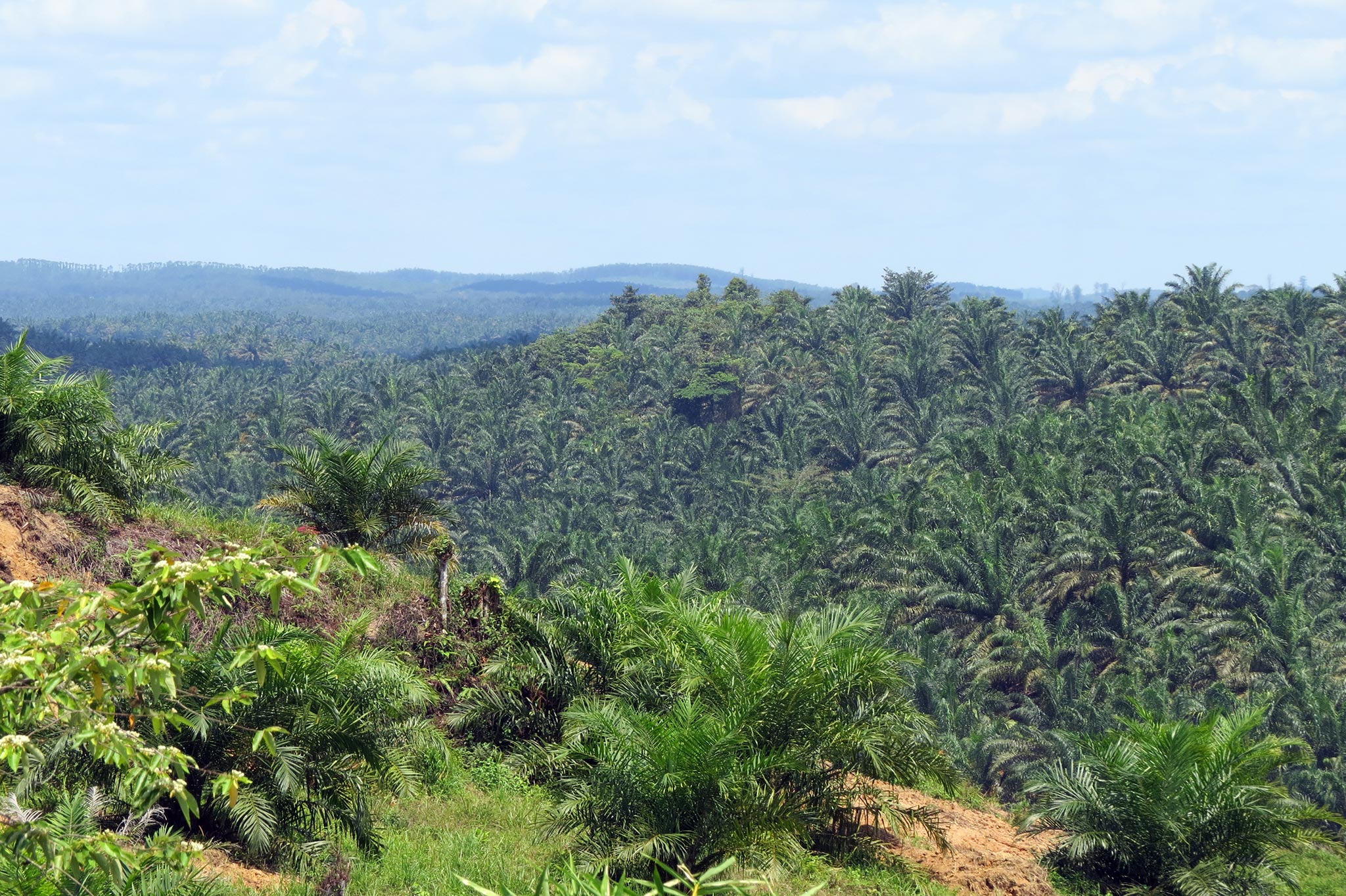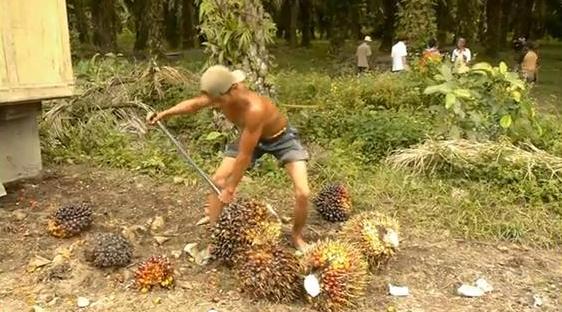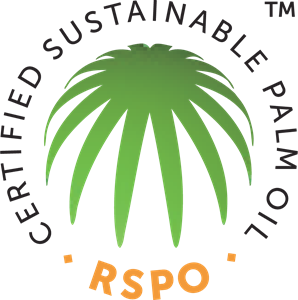Huge demand for palm oil is undoubtedly the greatest threat to orangutans. As forests are converted to palm oil plantations, the animals are rapidly losing their habitat.
Native to West Africa, the oil palm tree produces large quantities of red fruits that, when crushed, produce an oil traditionally used for cooking oil, soap, and as a lubricant for steam engines. Palm oil is extremely versatile, and demand for it has skyrocketed. Today, nearly 78 million tonnes are produced each year for the world export market, with Indonesia and Malaysia accounting for 90% of this production (RSPO, 2019). Only 19% of this oil is certified as sustainable by the RSPO (RSPO, 2019).
Palm oil is now used in a wide array of food and consumer products, from ice cream and shampoo to peanut butter and candles. The World Wildlife Foundation (WWF) estimates that 50% of all packaged supermarket products contain palm oil, and demand is growing for its use as a "green" biofuel.
Shop Smart - download the Sustainable Palm Oil Shopping App
The palm oil industry benefits Indonesia and Malaysia. It's an essential factor in both countries’ recent economic growth. While industry should be welcomed in countries where many live below the poverty line, the current nature of the industry in Borneo and Sumatra is having a detrimental effect on orangutans.
Because orangutans mostly eat fruit, they mainly live in fruit-rich lowland forests. Unfortunately, this land is often the most attractive to palm oil companies. Current practice involves clear-cutting--stripping the forest of all of its timber and selling it off. Fires are then set to rid the land of any wood debris, clear the undergrowth, and create fertilizing ash. As the fires burn, the wildlife either dies or flees the area. The animals are often killed by neighboring plantation workers or starve to death. When the oil palms are planted, the fragile rainforest ecosystem that developed over millions of years is lost. Between 80% and 100% of the wildlife inhabiting tropical rainforests in Indonesia and Malaysia cannot survive in oil palm monocultures, according to WWF Netherlands.

Oil palm plantations now cover more than 12 million hectares of land in Indonesia (ISPO). Despite numerous scientific reports detailing the costs of palm oil expansion to biodiversity, endangered species, indigenous tribes, and global carbon emissions, as well as worldwide media pressure regarding the plight of endangered species like the orangutan, Sumatran tiger, and Bornean elephants, the conversion of forests to plantations continues unabated.
Even world-famous national parks in Indonesia aren't safe from the rampant spread of palm oil plantations. One example is Tanjung Puting National Park in Central Kalimantan, which is home to approximately 6,000 orangutans. This park has been under serious threat, and if the local government's plans to allocate palm oil concessions on the park's eastern border proceed, a quarter of the park will be lost. Plans by a British company to convert the Tripa peat swamps of northern Sumatra into a palm oil plantation could cause the remaining population of Sumatran orangutans in this area to become extinct within four years. It could also destroy a coastal ecosystem that saved thousands of lives when its forest buffered rising tides during the 2004 Asian tsunami.

The spread of palm oil plantations is one of the greatest threats to orangutan survival, but it's also an important driver of future economic growth in Indonesia and Malaysia. Despite repeated and high-profile warnings of the toll the industry is taking on the region's biodiversity, the number of plantations continues to increase.
In Indonesia and Malaysia, the area planted with oil palm has tripled from 24,000 square km in 1990 to 83,700 square km in 2007, an average annual increase of around 3,500 square km. Studies estimate that at least 55% of oil palm expansion in these countries came at the expanse of natural forests, with the remainder obtained from converting pre-existing croplands such as rubber and cocoa. In 2007 alone, Malaysia and Indonesia made US$14 billion and US$5.5 billion in palm oil export revenue. The industry directly and indirectly employs about a million people in both of these countries (Nantha & Tisdell, 2008).
Palm oil is cheap, and the tree has a high yield. It's also semi-solid at room temperature, so it doesn't need to be hardened to be useful as a shortening. As a result, palm oil is the most widely traded oil on the international market. Highly versatile, it is used in a variety of household products from margarine and shortening to cooking oil, soups, baked goods, and confectionary products. It can also substitute for hard animal fats such as butter and lard, as well as for soy, olive, or canola oil. Chocolate products such as candy bars and cake icing use palm oil as a substitute for cocoa butter. It's also found in ice cream, peanut butter, coffee whitener, canned cream soups, potato chips, milk, trail mix, and other snack foods (Brown & Jacobson, 2005). WWF estimates that 50% of all packaged supermarket products contain palm oil.
Finding a way to balance the spread of palm oil plantations and the increasing demand for palm oil on the international market with ecological needs is one of the greatest challenges for conservationists working in Indonesia and Malaysia. Condemning the entire industry or hoping that it simply fades away is unrealistic. As a result, conservationists have begun working with the industry to encourage sustainable palm oil.
On paper, all oil palm plantations should already be sustainable because Indonesia and Malaysia strongly regulate them. In Indonesia, which is home to the largest populations of orangutans and the most substantial tracts of rainforest in Southeast Asia, no significant land development activities can take place before a company obtains a valid Plantation Business Permit (IUP), which should only be awarded after an Environmental Impact Assessment (EIA) is approved.
According to Indonesian law, a company that develops an oil palm plantation without an EIA should have its IUP revoked (Greenpeace, 2009). Indonesian law also stipulates that any area that contains peat deeper than three meters should automatically have a legally protected status. It also stipulates that if any concessions contain forested areas, companies are forbidden from cutting trees or harvesting and collecting any forest products until they have obtained a Timber Cutting Permit (IPK), which is issued at a local level by either the governor or the district head (Greenpeace, 2009). Because orangutans are a protected species throughout the country, their presence in any forested area should, on paper, ensure its protection. In reality, these laws are routinely flouted.
To ensure adherence to the law and to encourage sustainable practices in the industry, the Roundtable on Sustainable Palm Oil (RSPO) was formed in 2004. The organization's goal is to bring together growers, processors, food companies, investors, and NGOs to find ways to make the industry more sustainable.
Through its consortium of NGOs and palm oil producers, this voluntary organization hopes to encourage palm oil producers to adopt practices and guidelines that will make palm oil production environmentally and socially sustainable. By joining the organization, companies are obliged to comply with the RSPO’s "Principles and Criteria," which stipulate that all palm oil producers commit to:

If all of these criteria are reached, palm oil producers are encouraged to have their palm oil plantations certified by the RSPO as sustainable, which would allow them to use the RSPO logo and advertise their palm oil as sustainable.
Launched with much fanfare and with the support of the majority of rainforest conservation charities, including OURF, the RSPO has tried to regulate the industry and bring the issue of palm oil and its sustainability to consumers. However, it has also been dogged by accusations of ineffectiveness, infighting, lax regulation, and competing interests. At the heart of these issues is the debate over whether palm oil can ever be truly sustainable, and whether such a complicated extraction, processing, and distribution process can ever be properly certified.
In response to these criticisms, the RSPO offers four different categories of certification, with different levels of certification depending on how thoroughly the palm oil can be traced from source to distribution. The most popular certification method is the Greenpalm scheme, an RSPO-endorsed trading scheme that enables palm oil producers to earn a premium for using sustainable production methods, regardless of whether their product is exported. RSPO-certified producers have issued certificates for each tonne of certified palm oil that they produce. End users can then "cover" their use of palm oil by buying the certificates from GreenPalm, in the process supporting sustainable palm oil production (GreenPalm website).
An issue that many NGOs have raised with the RSPO is its lack of ability to properly enforce rules, and the danger that RSPO membership is becoming a way for palm oil producers to present to the buying public a veneer of sustainability without any actual desire to produce their palm oil sustainably. Controversy arose in New Zealand in 2009 after Cadbury began putting palm oil in its popular dairy milk bars, prompting a public backlash by consumers and conservationists in the country. Cadbury eventually relented and announced it would revert to using traditional cocoa butter, but assured consumers that all the palm oil they used was certified and sustainably produced because it had independent GreenPalm certification.
While this assertion was reassuring for many consumers, closer examination revealed that the palm oil used was most likely not sustainable. As previously mentioned, GreenPalm issues certificates if a plantation proves they are producing palm oil sustainably. However, this just means that the company has at least one sustainable plantation, and the GreenPalm certificate can be sold to another company. The palm oil produced on that certified plantation is not sold or kept separately. It is simply put into the same tanker as the unsustainably sourced palm oil and shipped to manufacturers. In essence, the GreenPalm certificate doesn't guarantee that you're consuming sustainable palm oil (The Guardian, 2009).
In 2009, the International Animal Rescue discovered that First Resources, a Hong Kong-based palm oil company and member of the RSPO, was illegally clearing land in West Kalimantan. It was also responsible for a number of orangutan deaths and for capturing infant orangutans. After these orangutans were rescued, an official complaint was filed with the RSPO. While none of the company's plantations are certified as being sustainable, its membership in the RSPO states it must adhere to the Principles and Criteria of the organization. The RSPO agreed to look into the matter. However, First Resources is still an RSPO member, the complaint isn't mentioned on the company's page on the RSPO website, and the company is free to advertise its membership in the RSPO on its website. While the difference between being an RSPO member and having your production RSPO-certified are two very different things, the difference isn't always clear to consumers. For many, the RSPO is simply a smokescreen behind which palm oil producers sit (RAN, 2011).
In response, the RSPO points out that it's a voluntary organization with limited capacity to sanction companies that break its rules. It also has to balance the competing interests of the palm oil producers and distributors that are among its members.
For example, several NGOs reported IOI Group, Malaysia’s leading producers of palm oil, to the RSPO in 2011 after evidence showed that the company was responsible for illegally clearing large tracts of forest in Kalimantan. The RSPO responded by announcing that the company had breached its code of conduct, and set a deadline by which it had to provide a response to the accusations. Although critics were disappointed that the RSPO had not done more, the fact that it had publicly criticized an RSPO member was rare. The rebuke came a year after the RSPO had publicly rebuked PT Smart Tbk and its parent company Golden-Agri Resources for breaching RSPO rules, the first time it had done so (Reuters, 2010).
While conservationists welcomed these actions, they angered the Malaysian government and palm oil body. In 2011 they announced plans to form their own sustainable palm oil regulatory body, implying that the RSPO was becoming too strict (Mongabay, 2011). Some interpret this action as a sign that Malaysian and Indonesian palm oil producers are increasingly aware of the concerns about palm oil. However, others fear that if companies pull away from the RSPO, the industry's only recognized regulatory body will become largely irrelevant.
Although it needs improvement, the RSPO is currently the only organization able to regulate an industry that poses the greatest threat to orangutan populations in the wild. As the use of palm oil increases and a greater threat is placed on desirable lowland tropical forests, it's more imperative than ever for NGOs and the public to encourage business leaders to act responsibly. It's also important to pressure suppliers to ensure the palm oil they use in their products isn't responsible for destroying rainforests and endangered species.
Brown, E. & Jacobson, M. (2005). Cruel Oil: How palm oil harms health, rainforest & wildlife. Center for Science in the Public Interest.
FOE. (2006). The use of palm oil for biofuel and as biomass for energy. Friends of the Earth.
Greenpeace. (2009). Illegal forest clearance and RSPO greenwash: Case studies of Sinar Mas. Greenpeace.
Mongabay (2011).Malaysian government to launch RSPO rival for palm oil certification. Mongabay.
Nantha, H.S. & Tisdell, C. (2009). The orangutan-oil palm conflict: economic constraints & opportunities for conservation. Biodiversity & Conservation, Vol. 18, Issue 2, pp. 487-502.
Oil World Trade Journal. (2008). World oil factsheet.
RAN. (2011). The Great RSPO Membership Myth: Why Buying from RSPO Members Is Meaningless. Rainforest Action Network.
Reuters. (2010). Sustainable palm oil body censures Indonesia's PT SMART. Reuters.
The Guardian. (2009). 'Green palm oil' claims land Cadbury's in sticky chocolate mess. The Guardian, UK.